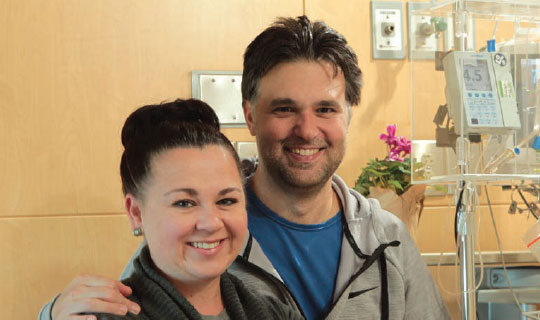“After five months of living a nightmare, I was given my life back. I’m able to be a mom and wife again. I can take care of my family. It’s truly amazing."

How a new medication for postpartum depression enabled one mother to take care of her family.
After Shaina Criscuolo gave birth to her third child in March 2019, she fell into severe postpartum depression (PPD). She experienced insomnia, anxiety, loss of appetite and energy, panic attacks and emptiness and had difficulty concentrating.
“It was hard for me to take care of the kids,” says Shaina, 37, a psychologist who lives with her husband and three children, ages 7, 3 and 6 months, in Lexington, Ky. “I’m normally active, but it was difficult for me to do anything I enjoyed.” She tried to return to work over the summer but lasted only a few weeks on the job.
Shaina tried prescription antidepressants but couldn’t tolerate the side effects, which included headaches, nausea and worsening anxiety and insomnia. So when she heard about a new drug for PPD through her work as a psychologist, she desperately wanted to try it. Brexanolone, which is sold under the brand name Zulresso, became the first U.S. Food & Drug Administration-approved medication for PPD in March 2019.
Brexanolone is given as a onetime infusion in the hospital over 60 hours to PPD patients who already have tried standard treatments, such as psychotherapy, support groups and medication.
At the time, brexanolone was only available at the Center for Perinatal Mood and Anxiety Disorders at Monmouth Medical Center (MMC). MMC was the first hospital in New Jersey and among the first in the nation to offer this groundbreaking treatment to new mothers. So Shaina decided to travel there in September 2019. "This medication was my only option,” she says.
Quick results
Shaina checked into MMC on a Wednesday morning. “The day after I began treatment I started to feel a little better, and by the third day I felt like myself,” says Shaina, who didn’t experience any side effects and was released two days later. “I don’t know what I would have done without it,” she says.
“After five months of living a nightmare, I was given my life back. I’m able to be a mom and wife again. I can take care of my family. It’s truly amazing.” RWJBarnabas Health medical group provider Robert Graebe, MD, Chair and Program Director of MMC’s Department of Obstetrics and Gynecology, says it’s not unusual for some patients to begin feeling better within 24 hours of starting the medication, which contains the hormone allopregnanolone, which can plummet after childbirth.
“Although the mechanism is unclear, the theory is that this loss of hormone is causing the problem,” he explains. Having a new treatment for postpartum depression is important because PPD is the most common medical complication of childbirth, affecting as many as one in five women. It can devastate mothers and their families, says Lisa Tremayne, RN, PMH-C, Director of the Center for Perinatal Mood and Anxiety Disorders at MMC. “It’s wonderful that you can see the results while patients are still in the hospital,” she says. “The women’s faces don’t look stressed anymore. It happens really fast.”
To learn more about treatment options for perinatal and mood and anxiety disorders. call: 732.923.5573. If you're in crisis, call: 732.923.6999.